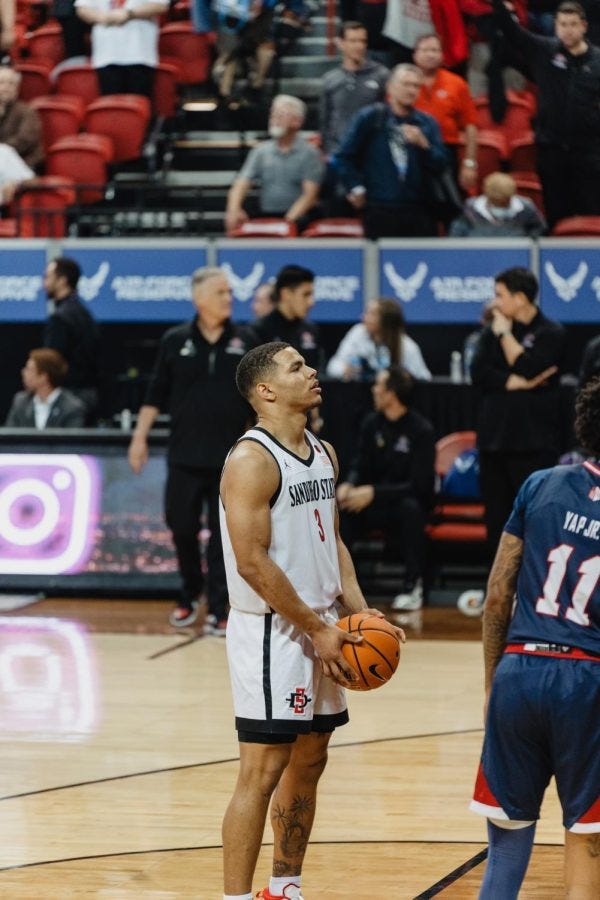Matt Bradley talks about returning for the 2022 season and how basketball saved his life
Adam Correa wrote this article for San Diego State’s Daily Aztec. It is available for republication or reference. If you think their work is important, you can support it here.

Twenty-two-year-old returning senior point guard Matt Bradley talked about his love for basketball and why he decided to return to San Diego State basketball in 2022.
Bradley was born in San Bernardino, Calif. and said his older brother was a huge influence on him playing basketball, but it ultimately got him out of bad situations growing up.
“Being from the neighborhood I’m from, there is not much offered other than getting involved in the wrong things,” Bradley said. “I had a lot of friends that I grew up with and if basketball didn’t pull me out of those groups, I would have ended up in jail or getting killed.”
He said he started taking basketball seriously around the age of 13 and he surrounded himself with new people and saw how much potential he had for the sport.
“It wasn’t until I was a junior in high school that I could do this in college,” he said. “It (basketball) saved my life to a certain extent.”
Bradley went to three different high schools: Rancho Cucamonga High School, San Bernardino High School and Wasatch Academy in Utah.
He started at Rancho Cucamonga for two years mainly to play football where he played with former Aztec and current Atlanta Falcons cornerback, Darren Hall.
After Bradley got over playing football, he transferred to San Bernardino because it was a school he could focus on basketball more.
For his senior year of high school, he went to Wasatch Academy in Utah which helped him put more focus on his basketball career. From there, he went on to play for the University of California Berkeley.
“It (Wasatch Academy) was an opportunity for me to develop as a person and a player for college,” Bradley said. “I’m glad I made all those decisions.”
Bradley’s decision to go to Cal Berkeley was for academic opportunities and playing high-level basketball in the Pac-12 conference.
He ended up at Cal Berkeley for three years before transferring to SDSU — a decision he made because of the COVID-19 pandemic. Transfering to SDSU also allowed him to be closer to his family
“For the past year and a half dealing with COVID, I made a decision to come closer to home and also be in an environment that is more conducive to winning,” he said. “Those were the outcomes and I’m happy with my situation.”
Bradley — who averaged 16.9 points per game and 5.4 rebounds per game in his first season at SDSU — talked about if the Mountain West Conference is more competitive than the Pac-12.
“The Mountain West, when it comes to level of play amongst all teams, is pretty balanced and in the Pac-12, you have really dominant teams and when you go to the lower table of the conference, you know it is going to be an unbalanced game,” he said. “Overall, the competitive level amongst all teams in the Mountain West is probably better.”
Before the 2021-22 SDSU basketball ended, Bradley made a decision to return for the 2022 season to get his degree in criminal justice and to play in front of the SDSU fans again.
“I’ve spent four years in college and to go without a degree I feel like would be a disappointment,” he said. “Then for the opportunity to compete again with my brothers, I love San Diego: the fans here are great, the environment here is great. I’ve made some great friends and I’m just thankful for the opportunity that I could come back again.”
Bradley also said playing in the NBA could be a consideration but doesn’t want to put that pressure on himself right now.
“I don’t know where my basketball career lies after college,” he said. “I’m living in the now dealing with COVID and realizing nothing is guaranteed so I’m taking advantage of the opportunities I have now and if I stress myself about going pro it takes me away from the moment.”
With Bradley — being an African American male — growing up in unsafe environments and finding basketball as a way out of those environments, gave a word of advice for young African Americans that are looking to pursue a career.
“Go where you’re needed, not where you’re wanted,” Bradley said. “If you go where you’re needed, they will use you to the best of your ability but if they feel they can dispose of you, then you will not be used to your fullest potential.”



